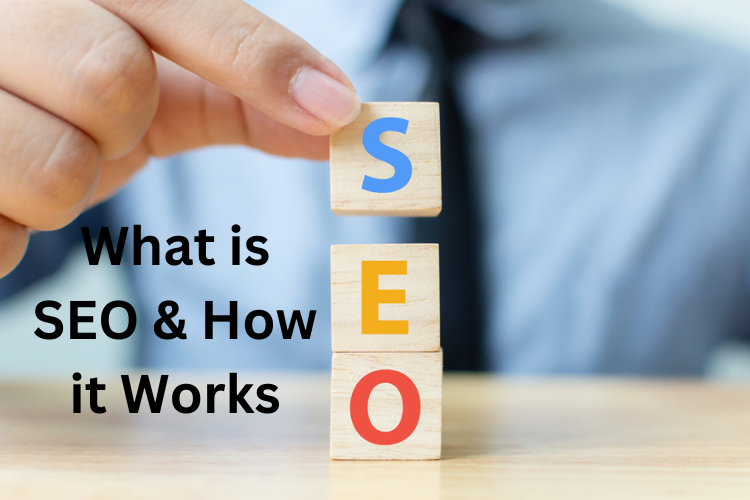In today’s over-abundant world, where we have plenty of everything, people spend hours online before making a purchase.
Google and other search engine offers reviews and other relevant information to assist the buyer’s decision-making.
So being a business owner or an individual seller, you have to invest your time, energy, and resources to strengthen your brand’s online presence, while providing your customers all the relevant information about your business to engage and convert them into loyal customers.
For your business to appear in the top search results, you need a strong SEO strategy and plan.
SEO experts throughout the industry partner with web developers, UX/UI designers, and other experts to make sure your website ranks in the top search results and you get the maximum traffic possible.
What is SEO?
SEO, or Search Engine Optimization, is a standard marketing phrase that is increasingly valued, particularly in the development of websites and applications.
It is the practice of optimizing a website or content to improve its visibility in search engine results. When a user searches for a specific topic or keyword, search engines like Google use complex algorithms to display the most relevant and high-quality results.

Types of SEO
Generally, there are two types of SEO: On-page and Off-page.
1. On-Page SEO
On-page SEO is the practice of optimizing individual web pages to improve their search engine rankings.
It involves incorporating SEO-rich keywords into the content, using meta tags, headings, and titles to make the content more noticeable to users.
The quality of the text, grammar, and other elements also play a role in on-page SEO.
By focusing on on-page SEO, businesses can ensure that their website is well-optimized for search engines and provides a seamless user experience.

2. Off-Page SEO
Off-page SEO, on the other hand, refers to the optimization that occurs outside of the website itself. This includes building backlinks, which are links to your website from other articles or websites.
When your website is mentioned or linked to other reputable sources, it increases your website’s credibility and authority in the eyes of search engines.
Building backlinks takes time and requires developing relationships with other content creators.
Why is SEO Important in Web Development?
If you’re a business owner or developer trying to reach a larger audience, you need to consider the importance of SEO in web development.
A well-optimized website can have a significant impact on your brand recognition. Especially, when it comes to outsourcing your web development to a white label web development agency, SEO should be your main priority.
What is White Label Web Development?
Whenever you outsource your service to another agency and present it as your work to your client is called the white label process.
It’s just like the blank; white label packing – where company A buys products or goods from company B and puts its name on the blank label.
If you’re an SEO agency and also get web development projects, partnering up with a professional white label web development agency is a great idea.
They have the experience, skills, tools, techniques, and strategies to build a responsive, functional, and convincing website, while you do it’s SEO and serve the main client.
So, without further wasting any time, let’s have a look at the top seven reasons why SEO is important when getting web development services.
1. SEO Enhances Web Traffic
Web traffic refers to the number of users who visit your website within a specific period.
To attract more visitors, your website needs to appear in the search engine results when users search for relevant keywords. While paid advertising can help increase visibility, organic SEO is a cost-effective way to attract more web traffic.
By optimizing your website with the right keywords, content quality, and other SEO factors, you can increase the chances of your website ranking higher in search results and driving more organic traffic.
2. SEO Increases Local Sales
For local businesses, attracting customers from their local area is often a priority.
By optimizing your website for local SEO, you can target users searching for nearby services. This involves including location-specific information, such as your address and local details, on your website.
When users search for “nearby services,” your website will be more likely to appear in the search results, increasing the chances of making local sales.
3. SEO Enhances the Quality of Websites
When users perform a search on Google, they are presented with a list of websites on the first page. Most users tend to click on the top results, assuming they are the best and most relevant.
This is where SEO plays a crucial role. Regardless of how good your content is, if it’s not optimized with the right keywords, it may not appear on the first page of search results.
By implementing SEO strategies, you can improve your website’s visibility and ensure that it appears among the top results, enhancing its reputation and quality in the eyes of users.
4. SEO Involves Less Effort
Compared to other marketing strategies like blogging or social media marketing, SEO requires minimal effort once implemented.
While social media accounts need regular engagement and content updates to stay relevant, SEO is a long-term strategy that can continue to drive traffic and leads even if you don’t actively work on it.
Once your website is well-optimized, it can appear in relevant search results without constant effort on your part.
5. SEO Is Cost-Effective
Paid advertising can be a money eater for your marketing budget. However, SEO is a cost-effective strategy that can yield long-term results without requiring significant financial investment.
While it may take some time to see the full impact of SEO, the organic traffic and leads it generates can provide a high return on investment.
By following SEO best practices and optimizing your website with the right keywords and content, you can increase your website’s visibility and attract more potential customers without breaking the bank.

6. SEO Helps Understand Customer Behavior
Through SEO, you can analyze the performance of your website and gain insights into user behavior.
By tracking metrics such as the time users spend on different parts of your website, the content they engage with the most, and their navigation patterns, you can better understand your customers’ preferences and needs.
This data can inform your content creation and marketing strategies, allowing you to tailor your website to meet the specific needs of your target audience.
7. SEO Improves Brand Reputation
When your website consistently appears at the top of search results, it creates a positive reputation for your brand. Users are more likely to click on websites that rank higher, which can lead to increased brand exposure and recognition.
As more people click on your content and find value in it, they may share it with others, further promoting your brand and increasing its reputation.
By implementing effective SEO strategies, you can improve your website’s ranking and enhance your brand’s reputation in the online marketplace.

How to Use SEO in Web Development?
Integrating SEO into web development is crucial for ensuring that your website is well-optimized from the start. Here are the steps to build SEO into web development:
1. Research
Before you start developing your website, conduct thorough research on your target audience, industry trends, and competitor analysis.
Identify relevant keywords that your audience is likely to search for and incorporate them into your content strategy.

2. Laying Out the Strategy
Create a detailed plan for your website’s design and content structure.
Consider the user experience, site navigation, and how you will incorporate SEO elements such as page titles, meta descriptions, and alt tags.
3. Optimization
Optimize your web pages with the identified keywords, ensuring that they are strategically placed in the content, headings, and meta tags.
Create an organized site structure with clickable titles, targeted keywords, site maps, and technically optimized elements.
4. Location Demographics
If your business caters to a local audience, make sure to include location-specific information on your website.
This can include your address, contact details, and any other relevant local information that will help users find and engage with your business.
5. Monitoring the Activity of the Site
Regularly monitor the performance of your website using web analytics tools.
Track metrics such as web traffic, search engine rankings, and user behavior to identify areas for improvement and optimize your website accordingly.
6. Maintenance
Continuously maintain and update your website to ensure optimal performance.
Address any technical issues, improve site speed, regularly update content, and stay up to date with SEO best practices to stay ahead of the competition.
Conclusion
By using SEO in web development, businesses can increase their online visibility, and attract more organic traffic, while building responsive and customer-centric websites.
SEO-friendly web design ensures that your website is optimized for both search engines and users, providing a seamless user experience and improving your chances of ranking higher in search engine results.
By incorporating SEO into your web development process, you can build a strong foundation for your website’s success and ensure long-term growth in the digital marketplace.


